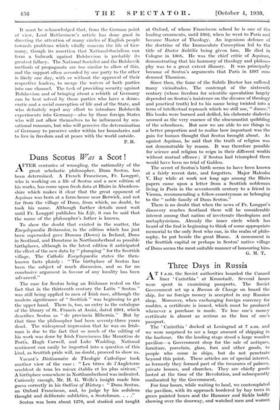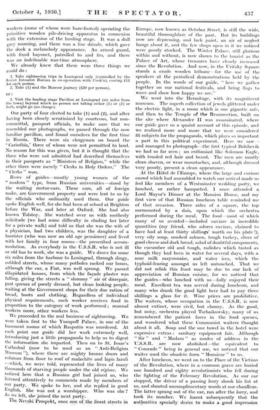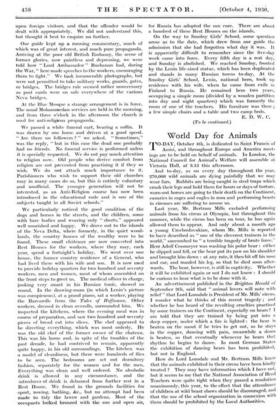Three Days in Russia
AT 1 a.m. the Soviet authorities boarded the Cunard liner ' Carinthia ' at Kronstadt. Several hours were spent in examining passports. The Soviet Government set up a Bureau de Change on board the ship, for no foreign money is accepted in any Russian shop. Moreover, when exchanging foreign currency for roubles, a certificate is issued, which must be produced whenever a purchase is made. To lose one's money certificate is almost as serious as the loss of one's passport.
The ' Carinthia ' docked at Leningrad at 7 a.m and we were surprised to see a large amount of shipping in the harbour. On the landing stage stood a large wooden pavilion—a Government shop for the sale of antiques, furniture, porcelain, glass, furs and other goods, to people who come in ships, but do not penetrate beyond this point. These articles are of special interest, as formerly they formed part of the treasures of palaces, private houses, and churches. They are chiefly goods looted at the time of the Revolution, and subsequently confiscated by the Government.
For four hours, while waiting to land, we contemplated the pavilion, with its approach bordered by bay trees in green painted boxes and the Hammer and Sickle boldly showing over the doorway, and watched. men and women workers (some of whom were bare-footed) operating the primitive wooden pile-driving apparatus in connexion with the extension of the landing stage. It was a dull grey morning, and there was a fine drizzle, which gave the dock a melancholy appearance. An armed guard, with fixed bayonet, patrolled to and fro, and there was an indefinable war-time atmosphere.
We already knew that there were three things we could do :
1. Take sightseeing trips in Leningrad only (controlled by the Soviet Intourist Bureau in co-operation with Cook's), costing EH for each person.
2. Take (1) and the Moscow journey (E20 per person).
or : 3. Visit the landing stage Pavilion at Leningrad (six miles from tie town) beyond which no person not taking either (I) or (2) or both, might go (no charge).
Our party of four elected to take (1) and (2), and after having been closely scrutinized by courteous, but non- committal, passport officials, to make sure that we resembled our photographs, we passed through the now familiar pavilion, and found ourselves- for the first time in Russia. There were six clergymen on board the 'Carinthia,' three of whom were not permitted to land. No reason for this was given, but it is thought that the three who were not admitted had described themselves in their passports as "Ministers of Religion," while the other three were merely "Clerks in Holy Orders." The " Clerks " won.
Rows of guides—mostly young women of the " modern " type, from Russian universities—stood by the waiting motor-cars. These cars, all of foreign make, are Government property and were lent to us by the officials who ordinarily used them. Our guide spoke English well, for she had been at school at Brighton before the War, and later at Oxford. She had also known Tolstoy. She watched over us with motherly solicitude (we had some difficulty in eluding her later for a private walk) and told us that she was the wife of a physician, had two children, was the daughter of a barrister (who was now an old age pensioner) and lived with her family in four rooms—the prescribed accom- modation. As everybody in the U.S.S.R. who is not ill or old has to work, she was a guide. We drove for some six: miles from the harbour to Leningrad, through dingy, cobbled streets, whose many potholes racked our bones, although the ear, a Fiat, was well sprung. We passed dilapidated houses, from which the façade plaster was falling, giving the streets a " slummy " air of disrepair, past queues of poorly dressed, but clean looking people, waiting at the Government shops for their due ration of bread, boots and clothing. Regardless of individual physical requirements, each worker receives food in proportion to the category of work performed ; manual workers more, other workers less.
We proceeded to the real business of sightseeing. We were taken first to the Yusupoff Palace, in one of the basement rooms of which Rasputin was murdered. At each point our guide did her work extremely well, introducing just a little propaganda to help us to digest the information. she imparted. Then on to St. Isaac's Cathedral (now to be used as an "Anti-Religion Museum "), where there are mighty bronze doors and columns from floor to roof of malachite and lapis lazuli —which, we were told, represented the lives of many thousands of starving people under the old regime. We noticed here that a Russian girl had joined us, who listened attentively to comments made by members of our party. We spoke to her, and she replied in good English. She was not a worshipper. Who was she ? As we left, she joined the next party.-
The .1•19yqki, Prospekt,. once one, of„the finest streets in Europe, now known as October Street, is still the wide, beautiful thoroughfare of the past. But its buildings now are depressing, and lack paint, an air of neglect hangs about it, and the few shops open in it we noticed were poorly stocked. The Winter Palace, still glorious within and without, is now shown to the tourist as the Palace of Art, whose treasures have clearly increased since the Revolution. And now, in the Uritzky Square stands a crude wooden tribune—for the use of the speakers at the periodical demonstrations held by the people. In the words of our guide, "here we gather together on our national festivals, and bring flags to wave and show how happy we are."
We went into the Hermitage, with its magnificent museum. The superb collection of jewels glittered under the electric light, in a room which is one gigantic safe, and then to the Temple of the Resurrection, built on the site where Alexander II was assassinated, where our guide gave its a quaint account of this episode, and we realized more and more that we were considered fit subjects for the propaganda, which plays so important a part in this political experiment. Here we saw- - and managed to photograph—the first typical Bolshevik we had so far seen ; an enthusiast like Solomon Eagle, with tousled red hair and beard. The men are mostly clean shaven, or wear moustaches, and, although dressed very poorly, present a clean appearance.
At the Hotel de l'Europe, where the large and curious crowd which had assembled to watch our arrival made us feel like members of a Westminster wedding party, we lunched, or rather banqueted. I once attended a. Lord Mayor's Dinner at the Mansion House, and my first view of that Russian luncheon table reminded me of that occasion. Three sides of a square, the top surmounted by a dais, upon which the orchestra performed during the meal. The food—most of which many of us avoided—included caviare in incredible quantities (my friend, who adores caviare, claimed to have had at least thirty shillings' worth on his plate !), very oily soup, smoked salmon, tough turkey, slices of good cheese and dark bread, salad of doubtful components, the cucumber old and tough, radishes which tasted as though they had been in water for several days, with a sour milk mayonnaise, and water ices, which the typhoid-fearing amongst us left untouched. That we did not relish this feast may be due to our lack of appreciation of Russian cuisine, for we noticed that the guides—who lunched with us—fully enjoyed their meal. Excellent tea was served during luncheon, and many who drank the good light beer had to pay three shillings a glass for it. Wine prices are prohibitive. The waiters, whose occupation in the U.S.S.R. is now almost extinct, were civil, but clumsy. As the good, but noisy, orchestra played Tschaikowsky, many of us remembered the patient faces in the food queues, and wondered what these Communist waiters thought about it all. Soap and the one towel in the hotel were expensive extras : sanitary equipment fair. Although " Sir " and " Madam " as modes of address in the U.S.S.R. are 310W abolished—the equivalent to " Comrade " being in general use, we noticed that our waiter used the obsolete form " Monsieur " to us.
After luncheon, we went on to the Place of the Victims of the Revolution, where in a common grave are buried one hundred and eighty revolutionists who fell during the fighting of the February Revolution. As our car stopped, the driver of a passing lorry shook his fist at us, and shouted uncomplimentary words at our chauffeur. The latter sprang out of the car, ran after the lorry, and took its number. We learnt subsequently that the alOorities specially desire to make a, good impression
upon foreign visitors, and that the offender would be dealt with appropriately. We did not understand this, but thought it best to enquire no further.
Our guide kept up a running commentary, much of which was of great interest, and much pure propaganda. Arriving at the poor old British Embassy, the scene of former glories, now paintless and depressing, we were told how "Lord Ambassador" Buchanan had, during the War," here made speeches to the workers, encouraging them to fight." We took innumerable photographs, but were not permitted to take military works, guards, gates, or bridges. The bridges rule seemed rather unnecessary as post cards were on sale everywhere of the various Neva bridges.
At the Blue Mosque a strange arrangement is in force. The usual Mohammedan services are held in the morning, and front three o'clock in the afternoon the church is used for anti-religious propaganda.
We passed a white funeral cart, bearing a coffin. It was drawn by one horse and driven at a good. Speed. "Are there no followers ? " we asked. "Sometimes," was the reply, "but in this case the dead one probably had no friends. No funeral service is performed unless it is specially requested We do not pay much attention to religion now. Old people who derive comfort from religion are not prevented from practising it if they so wish. We do not attach much importance to it. Parishioners who wish to support their " old churches may in many cases do so, but this is entirely voluntary and unofficial. The younger generation will not be interested, as an Anti-Religion course has now been introduced in the educational code and is one of the subjects taught in all Soviet schools."
We particularly noticed the good condition of the dogs and horses in the streets, and the children, some with bare bodies and wearing only "shorts," appeared well nourished and happy. We drove out to the islands of the Neva Delta, where formerly, in the quiet wood- lands, the country houses of the wealthy were to be found. These small chateaux are now converted into Rest Houses for the workers, where they may, each year, spend a fortnight's holiday. We went over one house, the former country residence of a General, who had lived there with his wife and son. It is now used to provide holiday quarters for two hundred and seventy workers, men and women, most of whom assembled on the front steps to greet us. The medical officer in charge, looking very smart in his Russian tunic, showed us round. In the drawing-room (in which Lenin's picture was conspicuous), at a grand piano, sat a worker, playing the Barcarolle from the Tales of Hoffmann. Other workers, dressed in clean overalls, surrounded him. We inspected the kitchens, where the evening meal was in course of preparation, and saw two hundred and seventy pieces of bread cut into slices. The chef appeared to be directing everything, which was most orderly. He was the old chef of the former owner of the chateau. This was his home and, in spite of the troubles of the past decade, he had contrived to remain, apparently quite happy, in his old surroundings. The kitchen was a model of cleanliness, but there were hundreds of flies to be seen. The bedrooms are. set out dormitory fashion, separately for the women and for the men. Everything was clean and well ordered. No alcoholic drink is allowed in any circumstance, and the
• introducer of drink is debarred from further rest in a Rest House. We found in the grounds facilities for • sport, rowing, bathing,: &e., but no attempt had been made to tidy the lawns and gardens. Most of the ' occupants loOked bronzed with the sun and open air, for Russia has adopted the sun cure. There are about a hundred of these Rest Houses on the islands. On the way to Smolny Girls' School, some question arose as to the date, which drew from our guide the admission that she had forgotten what day it was. It is apparently difficult to remember since the five-day week came into force. Every fifth day is a rest day, and Sunday is abolished. We reached Smolny, fronted by the Lenin life-sized statue, which has been duplicated and stands in many Russian towns to-day. At the Smolny Girls' School, Lenin, national hero, took up residence with his wife, when Ile came from exile its Finland to Russia. He remained here two years, occupying a simple room (divided by a wooden partition into day and night quarters) _which was formerly the room of one of the teachers. His furniture was there ; a few simple chairs and a table and two camp beds. E. D. W. C. (To be continued.)






















































 Previous page
Previous page